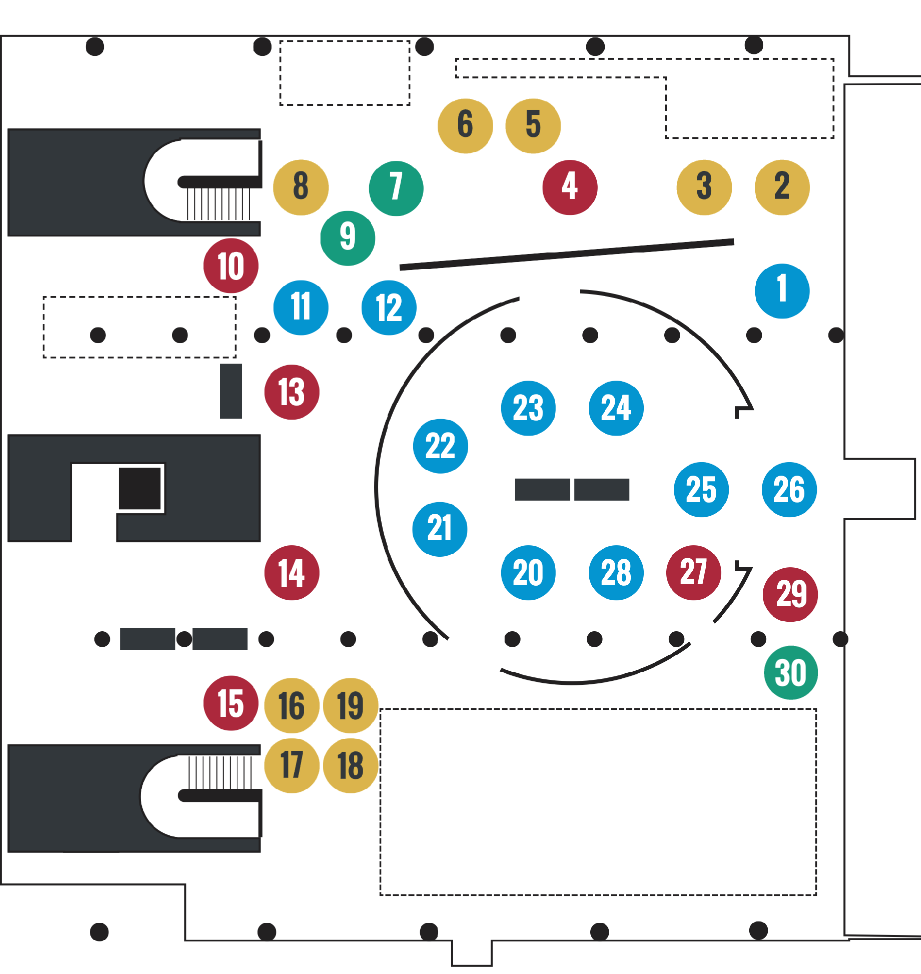Speed Learning and NetworkingSpeed Learning provides a fast-moving discussion platform for knowledge-sharing and helps teams to network. The 29 case studies will be presented simultaneously at ‘bar tables’ marked by numbers, in 5 x 15 minute sessions (14 minutes for presentation and interactive discussion, and 1 minute for changing tables). The case studies will consist of short presentations followed by discussion. A bell will be sounded when it is time for delegates to change to another table. |
||
Community engagement |
Traffic management for civilised streets and cleaner air |
||||
Cycling & walking |
Understanding behaviour change |
||||
| View the projects | View the projects | ||||
| View the projects | View the projects | ||||
 |
 |
 |
||||
Prescribing Cycling for HealthSam Robinson, Director, Love to Ride Why aren't we prescribing cycling for health? Love to Ride present a case study that gets behind the project to see how the unique benefits of cycling can impact people and their lives in a remarkable way. We will also take a look at programme outcomes and survey responses from Love to Ride project cities around the world. |
Wheels of WellnessFleur Ammerlaan, Projects Coordinator, Love to Ride Love to Ride have been running behaviour change programmes to encourage cycling for more than 10 years. This session introduces data collected from Love to Ride programme activity in the UK, US, Australia and New Zealand and look at the impacts that Love to Ride interventions have had on participants’ physical and mental health
|
#StepUpSouthamptonJasmin Downs, Senior Communications Officer, Sustainable Travel, Southampton City Council & Victoria Doyle, Marketing Co-ordination Manager, Solent Transport In October 2017, My Journey (the sustainable travel brand of Southampton City Council) challenged the city to take part in #StepUpSouthampton – a walking campaign that aimed to improve health and increase the use of active travel. #StepUpSouthampton encouraged those living and working in the city to swap one short car journey to reach a 10,000,000 step target together. By the end of October, the target reached was 11,563,853 steps.
|
||||
 |
 |
 |
||||
Walk more with Go JauntlySteve Johnson, Managing Partner & Gabrielle Rowan, Project Manager, Go Jauntly This session will look at new ways to encourage people to get outside and re-connect with nature and the environment. We will show how we are using technology to motivate hard to reach groups to improve their physical health and mental wellbeing, and also discuss our product roadmap. |
Can co-mobility complement a healthy, car-lite lifestyle?Conor Walsh, Research and Policy, Bikeplus The nature of travel and commuter travel lends itself to a form of behavioural lock-in, as commuters become dependent on what they know. They become blinkered, or even irrational, in their mode choices. How can shared transport break this cycle of car-dependent behaviour? Our research from the Bikeplus annual survey shows that bikeshare supports people who are new to cycling, including those who are less likely to be a ‘cyclist’ in the first place, and increases the amount people cycle. |
Encouraging healthy behaviourDominique Le Touze, Consultant in Public Health, Portsmouth City Council This session will cover the basic principles of behaviour change theory and science, using case studies of where this has been applied to transport and health. Learners will then be encouraged to apply these principles to an issue or problem on their 'patch', so facilitating sharing knowledge, experience and networking with colleagues from other areas, allowing participants to develop practical 'take-aways' from the session.
|
||||
 |
 |
 |
||||
C-ITS (Co-operative Intelligent Transport Systems)Paul Darlow, Traffic & Network Manager, Portsmouth City Council C-ITS is an area of technology involving communications between vehicles and infrastructure and between vehicles themselves. This allows road users and traffic managers to share information and use it to coordinate their actions. Portsmouth City Council has focussed in 2017/18 initially on one-way communication from vehicles to infrastructure via bluetooth, to determine travel-time between network nodes. This enables whole-route travel-times to be calculated, which has been enabled for the city's Eastern Corridor as a test-bed area for the technology. Origin and destination points of traffic movements across the network can be measured, including the routes taken. |
'Near miss' reporting pilotJames Luckman, Portsmouth City Council Portsmouth's ambition is to lead the country in recording 'near miss' incidents for cyclists. 'Near miss' reporting will be trialled for a period of six months starting from March 2018, completed via an online reporting form. An evaluation of the trial will determine the future scoping of 'near miss' reporting and, potentially, the capture of third party reporting through video capture. The information collated will be used to support informed decision-making for scheme prioritisation, transport priorities and behavioural change initiatives. |
Portsmouth's on-street and off-street EV networkHayley Chivers, Portsmouth City Council Portsmouth is one of only two local authorities to have been awarded the Office for Low Emission Vehicles (OLEV) On-street Residential Chargepoint Scheme (ORCS). Portsmouth have been awarded £100k towards 75% of the capital costs of electric vehicle chargepoint infrastructure for residential areas which do not benefit from off-street parking. The bid was for 59 electric vehicle charge points across 21 locations. In July 2017, approval was given for a two-year trial of CityEV electric vehicle (EV) chargepoints in three off-street PCC owned car park locations with high visitor numbers and dwell time. The trial will include free EV charging for at least the first year. |
||||
 |
 |
 |
||||
Save now, pay later: supporting independent travelDavid Beaman, Chair, South West Surrey Disabled Alliance Network This talk outlines the health consequences of reducing financial support for bus services, introducing parking charges for blue badge holders and the potential loss of concessionary free travel. Reductions in Central Government grants are resulting in decisions currently being taken by local authorities and NHS Trusts with little understanding of the wider cost and health implications of their actions. These actions can only result in subduing levels of travel amongst sections of society, and it is critical that potential long-term impacts are considered now. |
E-Cycle Service DeliveryChris Gregory, Director, A-To-There Ltd The Isle of Wight Council Access Fund programme includes interventions which aim to facilitate service delivery using electric bikes, especially in the care sector. Delivery of domiciliary care services is a major trip generator on the Island, and the programme includes a project which enables care visits to be made using electric bikes instead of cars and vans. The project partner is Island Healthcare Ltd. |
Safety implications of increasing cycle exposureGeorge Ursachi, Agilysis Limited This talk presents an analysis of the relationship between cycling risk and cycling exposure in England’s cities and explores what effort, and when, should be focused on in different life-cycle stages of a cycling community. A variety of data sets create cycling exposure and cycling risk levels for English cities. The talk provides a tool for road safety strategists around the UK and abroad. |
||||
 |
 |
 |
||||
INCENTIVES MOTIVATING ACTIVE TRAVELChristopher Bristow, Chief Operating Officer, Betterpoints Bella Mossa, a programme of active travel incentives, has been commissioned for a second year in Bologna, Italy, thanks to the success of its six-month predecessor in 2017. Bella Mossa is powered by BetterPoints’ Behaviour Change Management System, which uses a smartphone app to motivate people with a sophisticated mix of incentives. The 2017 scheme was funded by the European Horizon 2020 Empower programme, with the 2018 programme commissioned by SRM, Bologna's transport authority. The programme saw 15,000 people take part last year, motivating thousands of people to change their travel behaviour as well as giving SRM a wealth of data about how people travel around the city. |
Towards a model of pedestrian accessibility for all abilitiesDr Crispin Cooper, Sustainable Places Research Institute, Cardiff University & Richard Price, Sustainable Places Research Institute, Spatial network analysis has the potential to make models more detailed than is possible with conventional transport methodologies. Using data from Cardiff City Region collected during the Welsh Government’s mapping exercise mandated by the Active Travel Act (2014), we apply sDNA software to highlight areas at risk of being inaccessible to people with disabilities due to the presence of physical barriers. Data requirements for future models will be discussed. |
Co-design outside schoolsRachel Alcock-Hodgson, Bike it Plus Officer, Sustrans Parking outside schools is a dangerous and all-too-common activity. It creates additional risks for children, and idling cars put harmful pollutants in the air. Co-design projects outside schools bring together urban design and schools engagement expertise, delivering wide-ranging benefits, including reducing traffic speeds and limiting inconsiderate parking. This talk will discuss the positive outcomes of including school communities in the design process. |
||||
 |
 |
 |
||||
Scoping sustainable transportJulie Staples, Liftshare 'Scoping’ involves analysing transport data relating to commuters' surface travel options, factoring in the ability to recommend potential Liftshare opportunities within the location analysis of a cluster of people or employees. Behaviour change can only occur when users are made aware of their transport choices. Scoping provides an understanding of travel impacts, including the efficiency and potential cost saving in modal shift away from single occupancy vehicles, and enabling planners to open up doors to transport poverty areas. |
Connected communities: Greater Manchester Walking FestivalCarragh Teague, Transport for Greater Manchester (TfGM) As part of the Department of Health’s Get Active in Greater Manchester funding, TfGM coordinated the first ever Greater Manchester Walking Festival in May 2015. The event is now in its fourth year, this year attracting over 4,700 participants on a walk during May. The Festival has delivered a 76% increase in the number of participants, more than 19,000 miles walked in 2017, and a new social media toolkit and corporate partnership to promote walking for the future.
|
The development of 'early years' physical activity habitsNicola Blake, Public Health, East Sussex County Council (ESCC) and Pete Zanzottera, Balanceability East Sussex has put in place a 'whole system' transformation programme to improve health outcomes, as part of the East Sussex 'Better Together' project. Obesity is recognised as a significant challenge, with 1 in 5 children overweight or obese when they start primary school. East Sussex CCGs, ESCC and nurseries worked together to embed obesity prevention as part of core nursery activity, through an innovative programme of support, £5,000 grants to 140 participating nurseries, and a link to Balanceability, the only accredited ‘learn to cycle’ activity programme for children aged 2½ to 6 years in the UK.
|
||||
 |
 |
 |
||||
Better travel choicesAndrew Hough, Travel Choices Programme Manager, Transport for Greater Manchester (TfGM) Over the last five years, the Travel Choices team at TfGM, working with Aecom, have delivered Personalised Travel Plans (PTPs) aimed at reducing single occupancy car use, raising awareness of alternative options and encouraging sustainable travel, mainly for commuting. To date over 70,000 employees, residents, jobseekers, students and apprentices have participated. The project is now offered in a digital format, resulting in a more cost-effective and flexible delivery model. |
Beyond the Bicycle: a practical guide to inclusive cyclingNeil Andrews, Wheels for Wellbeing Wheels for Wellbeing is a charity offering a fleet of over 200 cycles (handcycles, tandems, tricycles, recumbents, wheelchair cycles, side-by-sides and bicycles) that disabled people of all ages can use to enjoy cycling's health and wellbeing benefits. Disabled people are half as likely as non-disabled people to be physically active, resulting in shorter average life expectancies. Our new Guide to Inclusive Cycling shows how cycling can be made more inclusive. |
Active travel – the miracle pillHannah Chivers, Cycling UK If you invented a pill which addressed social isolation, lack of confidence, ill-health both physical and mental, helped improve air quality, reduced congestion, and helped create healthy streets, you’d be wise to patent it. This seminar will explore the alternative to an actual pill: Cycling UK’s community cycling programmes, especially in Portsmouth, where Cycling UK are integrating community work, campaigning and lobbying on transport issues, and community participation to shape local authority decision-making.
|
||||
 |
 |
 |
||||
The future of London’s Cycle RoutesDr. Alex Longdon, Strategy Planner & Sophie Edmondson, Principal Sponsor, Transport for London What should an ideal Strategic Cycle Network for London look like by 2041? Where are the most important corridors and areas for investment in cycling? Our presentation will outline the spatial analysis of complex and varied datasets, including the new Cycling Network Model for London (Cynemon), the updated Analysis of Cycling Potential, and population and employment forecasts, and show how to translate evidence-led findings into real life projects. |
An ambitious cycle strategy for SouthamptonIain Steane, Transport Policy Team Leader, Southampton City Council Southampton has ambitious plans for its future. Over the next decade the city will see a denser city centre, major leisure and retail opportunities and an increase in jobs and productivity. The 'dark side' to this ambition is the impact on the city and its transport network. To tackle these issues, a 10-year, £25m Southampton Cycle Strategy was developed in collaboration with stakeholders including Public Health, Planning and Environmental Health, and externally with interest groups, campaigns and businesses. |
Walking the way to health and fitnessHelen Corkery, Project Manager, South, Living Streets A generation ago, 70% of us walked to school – now it’s just over half. The government’s Cycling and Walking Investment Strategy includes targets to increase walking for the whole population and, specifically, to see 55% of primary school children walking to school by 2025. WOW, the year-round walk to school challenge, is having a big impact across the UK, delivering strong results from small investments and, after just five weeks, we see an average 23% increase in pupils walking to school.
|
||||
 |
 |
 |
||||
Secured by Design: taking cycle security to the next levelLuc Bonnici, Public Sector Sales Manager, Cyclepods This talk will explain briefly what Secured by Design (SBD) is and how it applies to our industry. A new 'gold standard’ gives public sector clients confidence in their investment, and the SBD marque acts as a theft deterrent. We will be looking at stand-alone cycle racks all the way up to 2-tier cycle hubs. Luc, a Sport Science Graduate, is well placed to offer expert advice on how councils can get the best value from their schemes whilst offering the best possible user experience to the cyclist.
|
Pedestrian priority street design: a case studyDavid McKenna, Studio Associate Director, IBI Group IBI have designed and delivered two recent, pedestrian priority schemes in Kidderminster and Chester. Both schemes were standard highway environments re-designed to increase economic activity by creating spaces where pedestrians feel comfortable to spend time and hence money, whilst also accommodating traffic, including buses. Video evidence is used to review whether the approach is successful. The Chester scheme has received particular praise from local blind Access Group representatives.
|
Using VR as a tool for community & business engagementAmanda Gregor, Urban Designer, Witteveen + Bos This presentation will discuss how Virtual Reality (VR) can be used as a tool for engagement, enabling people to experience what a place could look and feel like. We work on strategy, planning and design to implement Dutch-influenced walking and cycling infrastructure in the UK, and will present case studies from London and Eindhoven, Netherlands. We will be exhibiting the Virtual Reality of London Boulevard, so pop by our stand to experience what VR is like for yourself.
|
||||
 |
 |
 |
||||
What do cyclists want and what do they actually do?Patrick Charles Lingwood, Bedford Borough Council This talk is an examination of over 15,000 cyclists’ and non-cyclists’ attitudes and choice of cycling infrastructure. The Department for Transport (DfT) has pledged to double cycling by 2025. A key challenge facing local authorities is providing the right kind of infrastructure, we present evidence from 15 surveys conducted in the UK, Ireland, Australasia and North America which capture findings with particular relevance to current cycle and public health policy. |
Follow the peopleAngela van der Kloof, Mobycon Nowadays you can fill your whole week with discussions, festivals, meetings, music and more; a challenging development for everyone working in community engagement, as no-one may have the time and energy to participate in your event. But festivals and events may also open new opportunities for community engagement; in the Netherlands, European Social Innovation Week was approached as a platform for community engagement, and offered fertile ground for new connections. |
Improving air quality for near schoolsMatt Croucher, Associate & Sustainable Transport Lead, WSP As part of the London Mayor’s plans to tackle air quality, WSP has been commissioned to identify hard-hitting measures to lower emissions and exposure to pollution in and around 50 of the capital’s most polluted primary schools. Primary school children are amongst the most vulnerable groups, with 25% of primary schools in areas with dangerously high levels of air pollution. Road transport is a major contributor to ground-based emissions, and has a significant impact on air quality, accounting for around half of NOx emissions. These London’s School Air Quality Audits will provide a robust process and toolkit of measures to serve as best practice guidance to be rolled out more widely to schools.
|
||||
 |
||
Scooting – it’s been under our noses all this timeJames Rodger, Scootfit This presentation is designed to give the audience an introduction to scooting and how it can play a significant role in increasing active travel in any community or environment in the UK, alongside walking and cycling. Scooting is a serious and credible form of personal transportation available to everyone for short journeys from 2-60 mins. The presentation will be talk around the many physical benefits of scooting, its origins, fighting obesity in children and adults, the popularity of scooting, scooting vs cycling and walking, active travel at school and at the workplace, and how Scoot Fit plays a role in bringing all these things together in creating behavioural and social change. |
||
|
||||||||||||||||||||||||||||||||||||||||||||||||||||||||||||||||||||||||||

TRANSPORT
HEALTH
2018


PORTSMOUTH
1–2 MARCH





